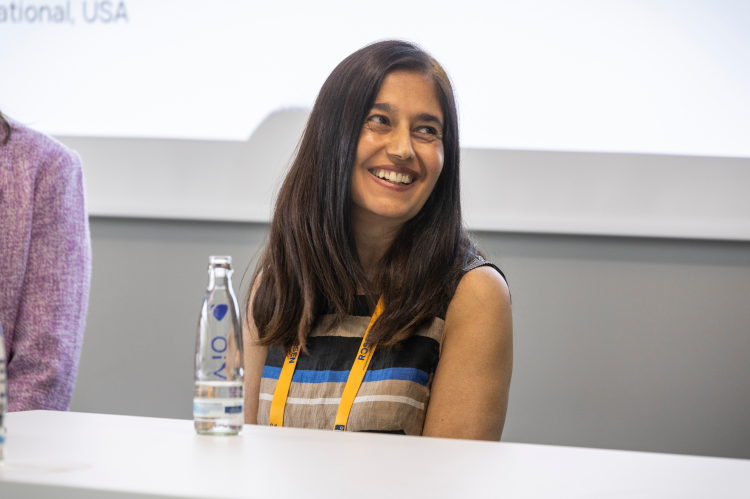Global Women Forum - Reena Sahney

Reena Sahney, founder and owner of Jiva, brings over 25 years of experience in the energy sector, specializing in training and consulting for the energy and infrastructure industries. With a strong engineering background and extensive project management expertise, Reena has contributed significantly to the field both locally and internationally. A member of APEGA and the INGAA Foundation, she has co-authored the "Encyclopaedic Dictionary of Pipeline Integrity" and received the CEPA Foundation's Outstanding Contribution & Achievement Award in 2020. Currently, she is pursuing a Master of Liberal Arts in Sustainability at Harvard University Extension School, reflecting her commitment to lifelong learning and innovation in the industry.
1. Reena, with over 25 years of experience in the energy sector, including as the founder of Jiva, you've navigated through a predominantly male-dominated industry. Can you share some personal experiences that highlight the challenges and triumphs women face in the pipeline business globally?
There is no question that at times navigating the industry has been challenging – especially early in my career, I would often be the only woman in the room. It was helpful to learn over time that even being the only woman in the room, I still had the ability to help set the tone and break down barriers to getting integrated into the team. While this could be high energy at times because my colleagues could not always relate to me, I learned different techniques to handle difficult and awkward situations. Inadvertently, these individuals became my (unintentional) mentors and helped me learn critical skills that have remained valuable in my career. There have also been other triumphs along the way. The biggest one for me is recognizing that there are allies everywhere -- if you are willing to take the time seek out and nurture relationships with like-minded individuals. I have been fortunate to have many people support my career along the way – some times when I least expect it!
2. As a trailblazer in the pipeline industry, what advice would you offer to young women aspiring to enter or advance in this field, considering its historically male-centric culture?
There is no doubt that navigating a historically male‑centric industry can be challenging to navigate for other individuals, however, keep in mind there are many allies along the way has been part of how I been able to stay the course. My thoughts would be to stay patient, keep a sense of humor about things and build bridges with your peers and colleagues that are like-minded – the network of professional support can be invaluable over the length of your career.
3. Your involvement with organizations like APEGA, ASME, and others demonstrates your commitment to advancing women's roles in the pipeline sector. How do you see these organizations contributing to fostering inclusivity and empowering women in the industry?
I think these organizations can be an important focal point for supporting diversity and inclusion. A key role that they can actively play is providing a forum for discussing issues and challenges related to gender diversity – in essence initiating the conversation to raise awareness with organizations that may lag. Even without formal efforts, they provide a focal point to network with other women and allies in the industry. They also provide opportunities to get involved with committees and various industry level initiatives that can be hard to identify and access otherwise.
4. Co-authoring the "Encyclopedic Dictionary of Pipeline Integrity" is a significant accomplishment. How do you believe amplifying the voices of women in technical publications contributes to changing perceptions and promoting gender diversity within the pipeline technology realm?
I believe technical publications can be an important tool for establishing credibility through concrete demonstration of knowledge and expertise. As human beings, we struggle more to recognize and internalize abstract concepts or expression of skills – this is magnified when colleagues perceive gender differences in the workplace. Having technical publications, along with other tangible demonstration of competency, can be an important part of reducing the ‘gap’ with people to build common ground and establishing yourself as a credible contributor to the industry.
5. Winning awards like the CEPA Foundation's Outstanding Contribution & Achievement Award and being nominated for recognition through Alberta Women Entrepreneurs are testament to your impact. How do such acknowledgments inspire and empower other women in the pipeline business globally?
I believe awards and formal recognition can be important in providing role models for those that are earlier in their career. Having examples and models of people that have been successful – and “look” like you – can have a subtle, but deep, impact on whether other women feel empowered and can visualize their own success.
6. Pursuing further education, such as your Master of Liberal Arts in Sustainability at Harvard University, is admirable. How do you think women's perspectives, particularly those with backgrounds in engineering and project management like yourself, can drive sustainability initiatives within the pipeline industry and beyond?
Having the perspective of female engineers and project managers in addressing the issue of sustainability in present day society is essential. We are facing a complex set of challenges in terms of greenhouse gases, loss of biodiversity and of course social justice. These challenges require require a complex set of solutions. In my experience, difficult and complex problems benefit the most from having a diverse set of collaborators in establishing options and solutions going forward. Having women, particularly with technical backgrounds, is an essential part of moving forward if we are going to succeed.
